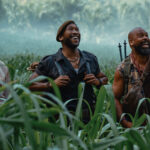The May 18th issue of the Chicago Sun-Times features dozens of pages of recommended summer activities: new trends, outdoor activities, and books to read. But some of the recommendations point to fake, AI-generated books, and other articles quote and cite people that don’t appear to exist.
Alongside actual books like Call Me By Your Name by André Aciman, a summer reading list features fake titles by real authors. Min Jin Lee is a real, lauded novelist — but “Nightshade Market,” “a riveting tale set in Seoul’s underground economy,” isn’t one of her works. Rebecca Makkai, a Chicago local, is credited for a fake book called “Boiling Point” that the article claims is about a climate scientist whose teenage daughter turns on her.
In a post on Bluesky, the Sun-Times said it was “looking into how this made it into print,” noting that it wasn’t editorial content and wasn’t created or approved by the newsroom. Victor Lim, senior director of audience development, added in an email to The Verge that “it is unacceptable for any content we provide to our readers to be inaccurate,” saying more information will be provided soon.
It’s not clear if the content is sponsored — the cover page for the section bears the Sun-Times logo and simply calls it “Your guide to the best of summer.” In a statement published to the newspaper’s website, the Sun-Times said the section was “licensed from a national content partner,” which 404 Media identified as media conglomerate Hearst. The Sun-Times said it was removing the section from digital editions and updating its policies so that third-party content meets the paper’s standards and is more clearly identified.
The book list appears without a byline, but a writer named Marco Buscaglia is credited for other pieces in the summer guide. Buscaglia’s byline appears on a story about hammock culture in the US that quotes several experts and publications, some of whom do not appear to be real. It references a 2023 Outside magazine article by Brianna Madia, a real author and blogger, that I was unable to find. The piece also cites an “outdoor industry market analysis” by Eagles Nest Outfitters that I was unable to find online. Also quoted is “Dr. Jennifer Campos, professor of leisure studies at the University of Colorado,” who does not appear to exist. Buscaglia did not immediately respond to a request for comment but admitted to 404 Media that he uses AI “for background at times” and always checks the material.
“This time, I did not and I can’t believe I missed it because it’s so obvious. No excuses,” he told 404. “On me 100 percent and I’m completely embarrassed.”
Another uncredited article titled “Summer food trends” features similar seemingly nonexistent experts, including a “Dr. Catherine Furst, food anthropologist at Cornell University.” Padma Lakshmi is also attributed in the piece for a quote she doesn’t appear to have said.
News outlets have repeatedly run AI-generated content next to their actual journalism, often blaming the issue on third-party content creators. High-profile incidents of AI-generated content at Gannett and Sports Illustrated raised questions about the editorial process, and in both cases, a third-party marketing firm was behind the AI sludge. Newsrooms’ defense is typically that they had nothing to do with the content — but the appearance of AI-generated work alongside real reporting and writing by human staffers damages trust all the same.
Update May 20th: Added additional details about the Sun-Times’ response to public outcry.
Read the full article here















